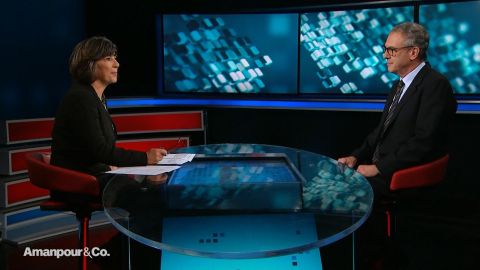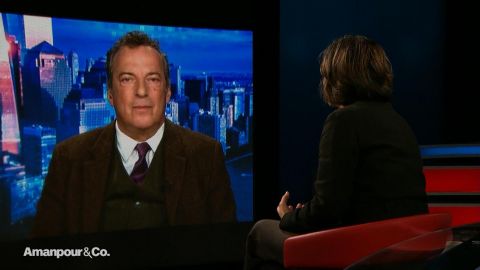Read Transcript EXPAND
SIMON FRASER: Well, a lot of these people are driven by a sort of ideological aversion to the European Union, and they’ve taken different positions at different times. Now, let’s be clear, I’m somebody who favored remaining in the E.U. and I think I have to say that. But their position is inconsistent. And I think the people of Britain just want clarity at the moment and particularly businesses want clarity about — and continuity about what’s going to happen because March is not a long way away. And at the moment, we are on schedule and it’s legally written into law that we’re going to leave on the 29th of March. If we don’t have a deal with the European Union, that is going to be a really serious situation.
CHRISTIANE AMANPOUR: OK. So, what does that look like? Because we’ve already seen the pound fell by more than 1.5 percent against the euro and the dollar. People look worried and people are saying that the markets have been remarkably complacent about this potential chaos. I mean, I heard interviews about potential — you know, making deals to fly in medicine and being worried that some people might not survive actual — there might be people’s lives at risk if there’s no deal and we crash out.
FRASER: Well, those are the worst-case scenarios. And personally, I don’t think it will come to that but there’s a very serious risk it does if we don’t get the politics sorted out and get a sort of coherent process in place. Because we will leave the European Union and we’ll no longer be governed by the regulations of the European Union. And unless we’ve got an agreement that we’re actually going to stay in that relationship for a temporary period, at least, then there could be very serious disruption. And I think the markets have not really know what to make of this and I don’t think they’ve really priced that risk in fully in the past and we saw some of that today.
AMANPOUR: So, just, you know, to the international audience because the E.U. has already come out and cautiously welcomed this, so have some government leaders, obviously, they also have to pass it through the European Parliament and then all the E.U. 27 have to agree. I mean, nobody is out of the woods yet. But what are the main sticking points? There are three, right? It’s about Northern Ireland, the customs union, backstop, European Court of Justice?
FRASER: Well, the fundamental question is, what sort of relationship is the U.K. going to have with the European Union? And the U.K. hasn’t really decided that. If you want to stay in a close trade relationship with the E.U., you have to accept the rules of the European Union single market up to a point and that constrains you in other things you do. And so, that is the sort of dilemma that we face. And the E.U. are saying, “If you want to enjoy the benefits of trade with us, you have to decide how far you’re prepared to abide by our rules,” and that is the underlying issue, whether it’s related to Northern Ireland or the rule of the court or other things, that is the essence of that issue.
AMANPOUR: So, you know, put your foreign office hat back on and you’re negotiating hat back on, was there ever a likelihood that the hardline Brexiteers who just wanted a clean break, was it even remotely possible?
FRASER: Well, it was remotely possible if we were prepared to accept great damage in our relations with Europe
About This Episode EXPAND
Christiane Amanpour speaks with former head of UK Foreign Office Simon Fraser about Brexit, Sen. Kirsten Gillibrand about the future of the Democratic Party and author Tim Weiner about the Mueller investigation. Walter Isaacson speaks with musician Ben Jaffe, Creative Director of Preservation Hall.
LEARN MORE



